082818_YKMV_A14.pdf



August 28, 2018 • Page 14
Right
In
Tune
EDITOR’S NOTE: The Press & Dakotan is looking at the
evolution of how you are entertained. This is the next part of a
River City series that, in the coming months, will explore how
the consumer experience has evolved in a number of entertainment venues — from streaming television, to concerts, to
going to the movies and more — and where these experiences
are heading.
———
BY ROB NIELSEN
rob.nielsen@yankton.net
People of a certain age remember the first Beatles song
they heard.
People of a certain age fondly remember the day they
picked up a recorder for the first time in music class. Their
parents likely do not share this enthusiasm.
But no matter what, we’ve all been touched by music in
some way or another, from listening to it to learning about
it. And whether it’s recording, teaching or disseminating
music, one thing is certain — it has evolved significantly in
the last four decades.
Recently, the Press & Dakotan sat down with two individuals who have helped bring music to the world in their
own unique fashions.
• Jeremy Schaeffer is an audio recording engineer from
Scotland. He has maintained a recording studio — All Poetic
Audio — in Scotland for nearly a decade and has been part
of a number of bands throughout his life, presently as lead
vocalist for Earth Groans.
• Dena Den Herder teaches music and fifth grade band
lessons at Yankton’s Lincoln Elementary School. She has
taught at Lincoln for 10 years with a combined 17 years
working in music education.
CHANGES
It goes without saying that, when it comes to music —
whether it’s listening to it or teaching it — there’s a little
difference between today and the past.
Schaeffer said, in music, what’s old one day may be new
the next.
“There’s different fads,” he said. “It’s like clothing styles
— everything comes back around. It’s like we’re coming
back to the ‘80s kind of sound. That’s the ‘new’ sound in alternate rock. It’s interesting to see how things go and come.”
Den Herder said changing styles have also applied to
teaching music.
“When I was a kid, at my school, we didn’t have a music
room — there just wasn’t room for a music room,” she said.
“The music teacher would push the big old piano down the
hall or (would bring) the record player, and she’d have the
books and you’d sit and listen. You’d listen to the song and
you’d sing it, and that was about it.”
She said her classroom is a far cry from those old days.
“With my classroom, we’re up dancing, we’re moving,
we’re bringing in instruments,” she said. “We’re very active
in the classroom.”
Den Herder said kids are extremely enthusiastic about
music classes these days.
“I do a lot more activities than I used to,” she said. “Kids
have video games. They’re used to a lot of stimuli, and in
order to keep their attention, I need to keep class moving.
They’re very excited, but I need to keep them moving.”
Schaeffer said musicians in modern times haven’t kept
up this same level of enthusiasm.
“I feel some of the musicians are a little lazier,” he said.
“I think our generation is lazy when it comes to musicians
and musicianship. Back then, you could either play it or you
couldn’t, and that’s just how it was. Now I feel like people
can get on stage, play it sloppy and call it good.”
He said that technology has also grabbed ahold of the
modern musician — and it’s helping with live shows.
“We’re a lot more dependent on our computers,” he said.
“People are playing with backing tracks these days, which
is great and cool. It adds to the show. … People are playing
the metronome clicks inside their ears. People have in-ear
(receivers) and they can hear themselves, so it’s helping us
become better performers.”
As with the recording industry, technology is also making
its way into the classroom as far as music is concerned.
“One of the first textbooks I had here, we’d have listening
maps,” Den Herder said. “It’d be printed in the music books
and the kids would have to look around. Now there are
animated maps to go on the smart board. They’ll show the
visual difference.”
In addition to the smart board, she uses iPad games to
help in fifth grade band lessons for practice.
Den Herder said she uses a similar app when teaching
fourth grade students the recorder.
“The last 5-10 minutes, when we’re done playing songs,
we play a video game and they all have to play the correct
notes, and hold it for the same duration,” she said. “Kids get
competitive when it comes to a video game. If they don’t do
the right thing, they get upset. It’s so much more interactive
and we have so many more tools to use.”
Though Schaeffer said laziness has become a part of the
music industry, he says there’s also been a rise in creativity
over the years.
“As time goes on, things have been done, and if you want
to stick out, people become more artistic and creative with
the ways they arrange music and write music,” he said.
“Who doesn’t like to hear something new?”
He added popular music has also become more technical
as the decades have come and gone.
“Van Halen and some of those bands back then could really shred and do all kinds of cool things with their music,”
he said. “Bands now have been doing so much more with
how technical they get. If you listen to the Beatles or the
Beach Boys, a lot of the music was very, very simple with
basic chord structure and it was all about the vocals. Now,
every instrument is extremely technical and very interesting
to listen to.”
IN THE STUDIO
Some of the biggest changes in music over the last four
decades have started in the studio.
“Today, it’s not hard to have a recording studio with
technology,” Schaeffer said.
“If you have a laptop, you
can literally have a recording
studio. They make it pretty
easy to just go out and buy
a cheap interface, some
YANKTON
CITYWIDE
RUMMAGE
spoons
fire pit
rakes
vinyl records
bike
rakes fire pit
fire pit household
snow blower
spoons yard ornaments
canopy
The World Of Music —
Whether it’s Listening To It Or
Performing It — Has Changed
Greatly In The Digital Age
“There’s tons of wonderful little video
clips you can show (students). Twenty
years ago, it might take you five hours to
find that one little piece of information.
You can Google it now and have it up in
five minutes. We can share that information and share that music with them
faster than we could 20 years ago.”
Dena Den Herder
software and pretty soon, you can set up a studio and you
can be making full productions.”
He added that in this era, you don’t necessarily even
need each instrument on site.
“They have ways of programming drums that you don’t
have to have a drum set to set up and record,” he said.
“It’s a lot easier and it’s a lot more consumer friendly. Way
back when (recording) music started, you had to have a
big space, you had to have nice acoustics in order to do a
record.”
In spite of the advances in technology, Schaeffer said
there’s still one thing any studio worth its salt still needs.
“You have to have somebody that has good ears to make
a good record,” he said. “People can make a record on their
own, but it won’t always stick out. One of the problems with
the industry is you have tons of these ‘bedroom studios’
where they’re making these dull sounding recordings.”
Schaeffer said there’s almost been a studio explosion in
the state.
“There’s literally hundreds of producers in the state of
South Dakota these days,” he said. “It used to be that there
was very few; there were two studios in the whole state. But
today you go to any big city and there’s going to be thousands of kids that can record a record or record their vocals
and be able to program instruments, and it’s going to get
easier and easier.”
He said it’s a far cry from the days before digital recordmaking — for better or worse.
“Musicians had to have talent back then,” he said. “We
joke about it a lot. I don’t know how Van Halen recorded
some of those solos because they had to play it all the way
through because it was on tape. There’s no copy-and paste,
there’s no aligning it, there’s no auto-tune — these guys
were singing well, they were playing well and today we do
it OK. We get it close enough and then we can tweak it in
post-production. … It’s nice in a lot of senses because you
can make everything perfect, but it’s kind of crap that you
can make somebody sound really good that doesn’t deserve
to sound that good.”
However, Schaeffer said the more consumer-friendly
nature of the modern recording industry is actually helping
make some musicians better.
“Kids are buying these softwares, they’re writing music
and it’s helping them write better music without having to
go to the studio,” he said. “Kids in high school are able to
record their ideas. Maybe it doesn’t sound great, but they’re
able to put their ideas down, hear it back and learn how
they can make it better.”
However, there could be some storm clouds on the horizon for the recording industry.
“CDs are going to be obsolete soon, which means record
labels aren’t going to be making as much money,” Schaeffer said. “Everything is going to streaming now, and people
aren’t making as much off of streaming sites as they were off
of CD sales.”
continued on page 15
rakes
...
nouncing
An
shop online at www.missourivalleyshopper.com
SEPT. 6 thru
TH
SEPT. 9
TH
LABOR DAY SPECIAL
Reward your hard work with a
Green Mountain Grill
All Ads Will Run September 6th, 7th & 8th
in the P&D for just $30
30 words and $.20 per word after 30. ONLY ONE ADDRESS ALLOWED IN EACH AD.
Stop By The Press & Dakotan To Place Your Ad
OR email classifieds@yankton.net
INCLUDES:
• • Your ad (30 words, 1 address per ad) placed in the
• Citywide Rummage Sale section published September 6-8.
• • Your ad will also appear on-line at www.yankton.net
• • 2 Yard Signs
•
• by the:
Sponsored
DEADLINE: NOON, FRIDAY, AUG. 31ST
Jim Bowie
$724
FREE 28lb
.B
Of Hard Wood Pe ag
With Purchase!llets
Daniel Boone
$549
Davy Crockett
$374
Easy As A Push of A Button
Set It & Forget It!
5 miles West of Tyndall on Hwy. 50 Corner of Hwys. 50 & 37
605-689-3909 or Cell 605-464-1113
www.schurmansfarmsupply.com


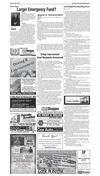


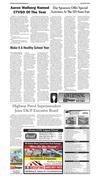
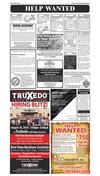
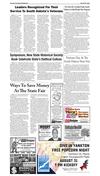


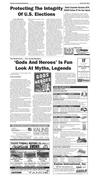

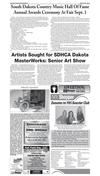
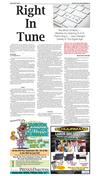


 Previous Page
Previous Page





